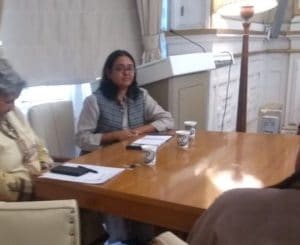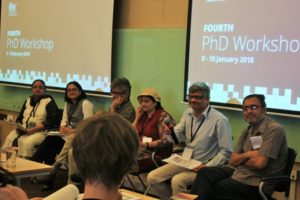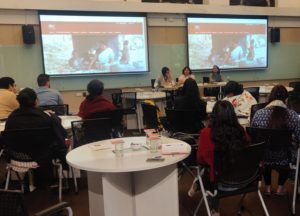Ashima Sood is Associate Professor at Anant National University, where she teaches urban policy, research methods and academic writing. She is International Corresponding Editor at Urban Studies and has been associated as editor and editorial advisory group member with the Economic and Political Weekly’s Review of Urban Affairs since its founding. She coordinated the Urban Transformations curriculum for EPG-Pathshala, an initiative of the Indian Ministry of Education to create postgraduate curricula across the disciplines. She also contributed the section on Indian Urbanization to the Oxford Bibliographies on Urban Studies.
Her research lies at the intersection of institutional economics and urban and development studies. It combines qualitative and quantitative methodologies to examine privatized forms of urban governance and informal public spaces in India. A co-edited volume titled India’s Greenfield Urban Future: The Politics of Land, Planning and Infrastructure is forthcoming at Orient Blackswan. She is working on a monograph titled Capital Citizens, analysing models of private local government in Indian growth hubs.
Her work has received funding and/or fellowships from the Urban Studies Foundation, the India Foundation of the Arts, the Azim Premji University Foundation, the Indian Institute of Advanced Study and the Centre de Sciences Humaines. Her research has been published in avenues such as Urban Studies; Cities; Territory, Politics, Governance; Journal of Institutional Economics; Marg, the Economic and Political Weekly; the India International Centre Quarterly, the Wiley-Blackwell Encyclopaedia of Urban and Regional Research and the World Social Science Report 2013, among others. She earned her PhD in Economics from Cornell University.
Sood is also a literature aficionado. She has a degree in creative writing from the University of California-Davis and has published essays, poems and stories in India and outside.



Words of Wisdom
The road less travelled can be lonely. Sometime, however, it can also lead to unexpected rewards. In my own career, I have alternated between academic teaching and “alt-ac” scholarly editing roles. Soon after my PhD, I joined the editorial team at the Economic and Political Weekly, India’s august – and utterly unique – scholarly and current affairs journal. My PhD advisor had described it as one of the most interesting places to do social science in India. He was right. Working alongside a group of scholarly journalists allowed me to see beyond the departmental – and intellectual – silos that sometimes shape academic life. I was also lucky to be around at the founding of the Review of Urban Affairs, a supplement of the EPW that became part of a tremendous new wave of urban scholarship in India.
Although academic administrators sometimes looked askance at my unconventional career trajectory, I found that my skills as an editor were an asset in teaching students critical reading and writing skills. In the domain of research, my close engagement with cross-disciplinary conversations and networks also opened up opportunities that I may have missed in a more orthodox path.
My advice to young people is, therefore, to be open to taking creative risks especially at an unprecedented time like this one when academia is undergoing a period of flux. Think about creating webs of interlocking skills and intellectual connections that will serve you well in academic and non-academic settings.
Equally important are the networks of solidarity you build. I have been exceptionally fortunate to have had the mentorship and encouragement of senior female scholars, who have guided and counselled me in difficult moments. Interestingly enough, the people doing the most cutting-edge work around the research questions I study are women and younger scholars. These friendships and conversations have spurred, stimulated and invigorated my work. Asking tough questions and offering deep insight, my students at Anant National University are the ones who remind me why praxis must be central to academic work.
Scholarly groups are often key to creating convivial and inclusive disciplinary and interdisciplinary cultures. The RSA’s open and globally inclusive membership and programming are a huge inspiration in my engagement with academic networks in India. The Women’s Network, especially, has been a wonderful platform for forging connections across geographies, for sharing stories of academic life and finding a warm and collegial virtual space. There is always so much for me to learn from colleagues in the network.
The challenge of building the post-COVID university is here and now. Let us work together to ensure that it will be a welcoming, diverse and joyful place.
New in 2020: Neoliberal exception to liberal democracy? Entrepreneurial territorial governance in India
Industrial Policy makes Indian Cities